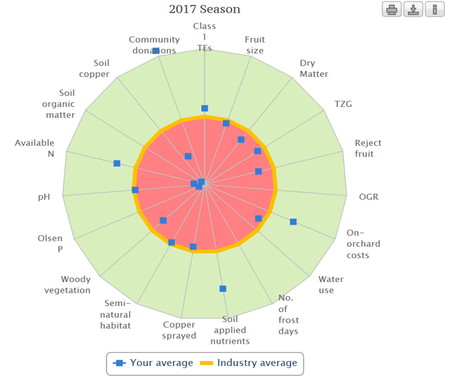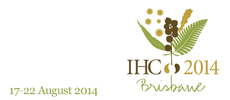Kiwifruit Case Study
The NZSD Dashboard Project has been working closely with the NZ Kiwifruit Industry since 2013 to enhance sustainability assessment and reporting through the provision of knowledge and tools (see below for more detail). The project has received funding and support from Zespri as well as other industry partners, shown above.
Click here to access kiwifruit dashboard tools.
Click here to access kiwifruit dashboard tools.
Knowledge outputs
To date, this project has culminated in the following three main reports for Zespri:
A. Prioritisation of sustainability issues for the NZ kiwifruit sector (2016). This used a combination of stakeholder consultation and literature review to identify and prioritise global sustainability-related issues as well as kiwifruit-industry specific issues.
B. Sustainability assessment of the NZ kiwifruit industry (2016). This reviewed available information to provide an assessment of how the NZ kiwifruit has been performing particularly on each of the issues identified in the prioritisation study. Much of this assessment was based on sustainability-related research undertaken prior to Psa's arrival in 2010. Much of this research was conducted by ARGOS researchers who are involved in the NZSD Project.
C. Proposed sustainability metrics for the NZ kiwifruit industry (2016). This provided a strawman sustainability framework for the NZ kiwifruit industry which includes proposed areas of focus, objectives for those and metrics that could be used to measure the current state and progress. Much of this was informed by the previous reports plus further consultation with Zespri. It was also informed by the broader NZSD Framework which has been developed from an intensive analysis of global frameworks and standards. The intention of the kiwifruit-specific framework was for it to be the basis for industry discussion and the development of an industry-agreed framework.
To date, this project has culminated in the following three main reports for Zespri:
A. Prioritisation of sustainability issues for the NZ kiwifruit sector (2016). This used a combination of stakeholder consultation and literature review to identify and prioritise global sustainability-related issues as well as kiwifruit-industry specific issues.
B. Sustainability assessment of the NZ kiwifruit industry (2016). This reviewed available information to provide an assessment of how the NZ kiwifruit has been performing particularly on each of the issues identified in the prioritisation study. Much of this assessment was based on sustainability-related research undertaken prior to Psa's arrival in 2010. Much of this research was conducted by ARGOS researchers who are involved in the NZSD Project.
C. Proposed sustainability metrics for the NZ kiwifruit industry (2016). This provided a strawman sustainability framework for the NZ kiwifruit industry which includes proposed areas of focus, objectives for those and metrics that could be used to measure the current state and progress. Much of this was informed by the previous reports plus further consultation with Zespri. It was also informed by the broader NZSD Framework which has been developed from an intensive analysis of global frameworks and standards. The intention of the kiwifruit-specific framework was for it to be the basis for industry discussion and the development of an industry-agreed framework.

Online tools
In addition to providing knowledge in the form of the previous reports, the project has developed prototype bespoke online web-based tools that can capture and report sustainability-related information. Industry partners were consulted closed during development in particular to identify content and functionality. Essentially three versions of the same tool have been developed i.e. one for an orchard system, one for a postharvest operation, and one for Zespri. The orchard and postharvest tools allow individuals to benchmark there performance against industry averages. It is hoped that this will drive improvement. The Zespri version aggregates data from the orchard and postharvest tools so that Zespri can view industry averages which it can use to inform decision making and policy, and to use to respond to customers and regulators. The tools contain relevant metrics across the economic, environmental and social pillars of sustainability.
The tools are still being developed and tested with support from Industry. In 2018 it is anticipated that a decision will be made by Zespri regarding the future of the tools as an ongoing option for capturing and reporting sustainability-related information.
Screenshots of version 1 of the tools are available here.
Click here to access a demo of the tools or the live version (for registered industry partners only).
In addition to providing knowledge in the form of the previous reports, the project has developed prototype bespoke online web-based tools that can capture and report sustainability-related information. Industry partners were consulted closed during development in particular to identify content and functionality. Essentially three versions of the same tool have been developed i.e. one for an orchard system, one for a postharvest operation, and one for Zespri. The orchard and postharvest tools allow individuals to benchmark there performance against industry averages. It is hoped that this will drive improvement. The Zespri version aggregates data from the orchard and postharvest tools so that Zespri can view industry averages which it can use to inform decision making and policy, and to use to respond to customers and regulators. The tools contain relevant metrics across the economic, environmental and social pillars of sustainability.
The tools are still being developed and tested with support from Industry. In 2018 it is anticipated that a decision will be made by Zespri regarding the future of the tools as an ongoing option for capturing and reporting sustainability-related information.
Screenshots of version 1 of the tools are available here.
Click here to access a demo of the tools or the live version (for registered industry partners only).
Related information
Power analysis tool
The NZSD Project has developed a statistical tool to inform how much monitoring is required when thinking assessing sustainability-related outcomes. For more information and an example of the use of this for nitrogen use in kiwifruit orchards, Check the Power Analysis page.
The NZSD Project has developed a statistical tool to inform how much monitoring is required when thinking assessing sustainability-related outcomes. For more information and an example of the use of this for nitrogen use in kiwifruit orchards, Check the Power Analysis page.

May 2015
Congratulations to our Industry partner Trevelyan's. They take lead in sustainability!
Trevelyan’s has just released its first sustainability report, based on the current fourth generation (G4) of GRI, the world’s leading international framework for corporate responsibility reporting. Read more.
Congratulations to our Industry partner Trevelyan's. They take lead in sustainability!
Trevelyan’s has just released its first sustainability report, based on the current fourth generation (G4) of GRI, the world’s leading international framework for corporate responsibility reporting. Read more.
January/February 2015
A long article (New tools to lift industry performance) from Jayson Benge about the NZSD project and on what has been developed for the Kiwifruit Industry so far has been published in the New Zealand Kiwifruit Journal (January/February 2015 release) along with about 20 pages on a “Focus on: Sustainability” theme.
A long article (New tools to lift industry performance) from Jayson Benge about the NZSD project and on what has been developed for the Kiwifruit Industry so far has been published in the New Zealand Kiwifruit Journal (January/February 2015 release) along with about 20 pages on a “Focus on: Sustainability” theme.

August 2014
Jayson Benge has presented a paper at IHC - 29th International Horticultural Congress, 17-22 August 2014, Brisbane, Australia.
18th August - The New Zealand Sustainability Dashboard: Connecting Growers, Industry, Consumers, Regulators and Policy Makers to Drive Sustainable Horticulture - Jon Manhire, Lesley Hunt, Isabelle Le Quellec, Henrik Moller, Andrew Barber, Jayson Benge*, Catriona MacLeod, Katherine McCusker, Christopher Rosin.
Jayson Benge has presented a paper at IHC - 29th International Horticultural Congress, 17-22 August 2014, Brisbane, Australia.
18th August - The New Zealand Sustainability Dashboard: Connecting Growers, Industry, Consumers, Regulators and Policy Makers to Drive Sustainable Horticulture - Jon Manhire, Lesley Hunt, Isabelle Le Quellec, Henrik Moller, Andrew Barber, Jayson Benge*, Catriona MacLeod, Katherine McCusker, Christopher Rosin.








